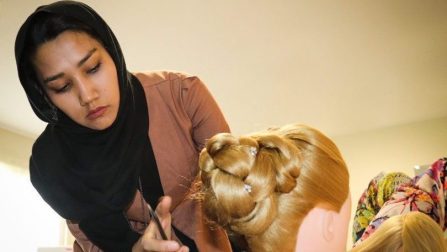Enterprising Afghan enrolled in beautician classes, but due to lack of economic opportunities made worse by COVID-19, she is struggling to start her own business.
Atefeh, 23,an Afghan refugee, lives in Iran with her family, who fled Afghanistan some 30 years ago. She strives to start her own business in order to support her family.
© UNHCR/Forough Jahandari
Up until a few months ago, she spent every day for six months meticulously practicing her beautician techniques alongside 15 other refugees during courses offered by the Iran Life Quality Improvement Association (ILIA), a non-governmental organization and partner of UNHCR, the UN Refugee Agency.
Atefeh dreamt of opening her own beauty parlour and for that, she would have to save enough to afford rent of the premise and salary of employees. But just as she started looking for an adequate source of income, COVID-19 spread across the Islamic Republic of Iran, forcing businesses to temporarily shut and freeze recruitment.
She was lucky to find part-time jobs making buttons and sewing shoes that she could do in the safety of her home. However, such unreliable, temporary and informal jobs, bring in only a meagre earning that is barely enough to allow her to support her family make ends meet, let alone put money aside in savings.
“I was told it was impossible for a refugee to succeed…”
But Atefeh refuses to give up and is eager to pursue her dream once the COVID19 situation improves and businesses slowly resume. “At every step of the way, I was told it was impossible for a refugee to succeed,” she says, “but I want to become one of the best beauticians.”
Born in Iran to parents who fled their native Afghanistan some 30 years ago, Atefeh is one of the nine siblings.
“My parents dreamed for us to get an education, build a better life and support each other,” she recalls with pride. Her older sister Mahboubeh earned a bachelor’s degree in business management, while her brother Shahin graduated a few years later in political science.
But when the time came for her to go to university, her family had run out of money.
“I remember the sadness in my father’s eyes when he told me he couldn’t afford the fees,” she says. “He works as a construction worker but had two or three side jobs. He said he could find more work, but he is old and I could not put him through more hardship.”
Atefeh found out about the vocational courses for refugees offered by ILIA by chance. “I read about their makeup and hairstyling curriculum and thought, why not? Anything is better than feeling helpless.”
Monireh Arezoumandi, the Director of ILIA, remembers the passion in Atefeh’s eyes when she came to register for the course at the centre on the outskirts of the bustling city of Tehran. “The first time I met Atefeh, I thought to myself, this girl is going to succeed. She had this confidence that made me believe in her.”

Atefeh, 23, an Afghan refugee, practices hair styling during vocation training at ILIA in Tehran, Iran.
Since 2016, ILIA has given the opportunity to more than 200 refugee and Iranian students to acquire new skills and capacities through a catalogue of courses. ILIA, with UNHCR support, also provide trainees who successfully complete their course with essential tools and equipment, such as scissors, combs, curlers and hairdryers, to help them establish their own businesses.
Iran is home to almost one million registered refugees, the vast majority from Afghanistan. Thanks to the Government’s inclusive policies, refugees can work in a range of occupations, as well as access national services like healthcare and education.
By being allowed to work and earn a decent living, refugees can meet the needs of their families and become more resilient. Equipped with skills, capacities and entrepreneurial know-how, refugees also feel more prepared to return and rebuild their lives in their home country, when conditions become conducive for their safe return.
“This is my chance to be more than just a refugee…”
UNHCR and ILIA have partnered with private companies like UNIQLO, a leading Japanese retail company, to help refugees acquire vocational skills, access financial services and start their own business. Since 2016, almost 19,000 refugees have benefited from the UNHCR-UNIQLO global partnership in India, Malaysia, Nepal, Iran and Pakistan.
For Atefeh, taking part in ILIA courses has changed her life. “Now I will be able to stand on my own two-feet and be independent,” she says. “This is my chance to be more than just a refugee – an active participant in my community.”
Share on Facebook Share on Twitter